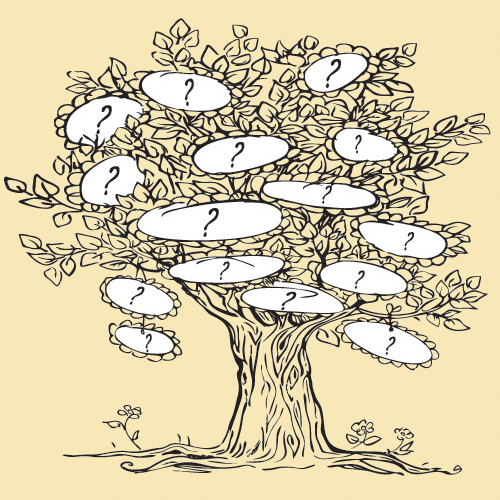‘Shut Up, and Be Grateful for Your Life’
We Need to Listen to Children Conceived Through Third-Party Reproduction

Last year, Bruce Feiler wrote a piece for The New York Times in which he began by regretting the bad behavior of his family at a reunion. He wondered whether his family was “falling apart.” That question prompted him to research what makes for a happy family.
Feiler found the work of Marshall Duke, a psychologist at Emory University. Duke came up with a questionnaire for children called the “Do You Know?” scale, which contained 20 questions about the child’s family history. Children were asked, among other things, if they knew where their mom and dad went to high school, where their grandparents grew up and which person they looked most like in their family.
What Duke found was surprising. The single best predictor of emotional health and happiness in children was how well they performed on the “Do You Know?” scale. Feiler wrote, “The more children knew about their family’s history, the stronger their sense of control over their lives, the higher their self-esteem and the more successfully they believed their families functioned.”
This finding may not be so surprising, considering the popularity of websites like Ancestry.com, where the creators invite visitors, “Join us on a journey through the story of how you became, well, you.” Even TLC has a genealogy show called Who Do You Think You Are? — which implies that our very identity is rooted in those people who not only begot us, but those who begot our parents and grandparents, as well.
And yet society has embraced, without question, creating children who will intentionally be denied part, or all, of their family history.
Using male and/or female gametes from anonymous donors is now commonplace in artificial reproductive technologies (ARTs) like artificial insemination, in vitro fertilization (IVF) and surrogacy. These techniques are often called third-party reproduction, because a third party is required to make procreation possible.
Many of the children produced by third-party reproduction are grown up now, and they are speaking out about what they feel is a horrible practice. Third-party reproduction purposefully conceives offspring who will be denied access to what Duke found to be the single greatest predictor of childhood emotional well-being and happiness: knowledge of their family’s story.
As the children of ART speak out about this injustice to a public that believes all it takes to raise a happy, well-adjusted child is a loving home, they often get the same response: When they try to share the pain and loss they suffer due to missing half, or all, of their family story, they almost invariably hear, “Shut up, and be grateful for your life.”
Alana Newman, a child of an anonymous sperm donor, created the Anonymous Us Project as a “safety zone for real and honest insights regarding third-party reproduction (sperm and egg donation and surrogacy).” The project is a repository of stories from parents, donors, surrogates and children conceived through ART. The entries are illuminating. The pain and sadness felt by the children of anonymous donors is palpable. Here is a small sampling:
“Thank you so much for giving me this life, anonymous father. ... And the system that allows this to happen anonymously, thank you so much! I have never felt more screwed over and depleted of my rights.”
“I have come to detest questions such as ‘Where are you from?’ ‘What nationality are you?’ or ‘Why are you an only child?’. ... Finding out that I am the ‘wanted child’ of a sperm donor doesn’t make these questions any easier to answer, and I often find myself asking more questions after the fact. Where do I come from?”
Newman has submitted testimony to the California Assembly Committee on Health, writing that, for the children of third-party reproduction, “being denied a relationship with at least one of their biological parents ... is a human-rights violation.”
Anonymous Us is not the only place where donor-conceived children have been speaking out. Jo Rose, a child of an anonymous sperm donor, points out in the U.K.’s The Guardian how nonsensical it is that her concerns are dismissed:
“One of the most upsetting things for me about the way I was brought into the world is the blatant double standard involved. My mother’s need to have a genetic link to her child was valued, while my need to know, love and understand the father with whom I have a genetic link was not.”
It is clear that children of third-party reproduction understand their natural rights have been violated, but, unfortunately, society has been too slow to acknowledge their perspective.
Nowhere was this more apparent than in the case of Gracie Crane. Gracie is a U.K. teenage girl full of angst, but not the kind that troubles most teenagers. She was adopted as a “leftover” IVF embryo. Gracie keenly feels the loss of her genetic roots, and the law in the United Kingdom prevents her from ever knowing who her biological parents are. The pain is so acute, she says, “There are times I’ve wished I’d never been born.”
Gracie should feel grateful for her life, as we all should, and she is lucky to have people who love her.
A good portion of the combox attached to Gracie’s story is filled with comments denouncing her as selfish and chiding her to just be grateful she has parents who love her. Many likened her case to adoption at birth and found her comments repugnant.
Her story is not like traditional adoption, however, which is a worthwhile attempt to make the best of a less-than-ideal situation. By contrast, Gracie was intentionally created as an “extra,” a “leftover,” only to be given a chance at life if one of her siblings failed to survive. She knows there is a “loving” family out there that has the “perfect” number of brothers and sisters, and she does not fit into that perfection. At the same time, she has an intense longing to know and be loved by them.
Gracie is blessed to have an adoptive mother and father who love her. Can’t we acknowledge, however, the pain she feels at being a “leftover,” created as an insurance policy in case her brothers and sisters didn’t “take”? Can we understand her anguish at being abandoned to deep-freeze and wait for rescue by the people who begot her? Will we recognize she was purposefully denied not just part, but all, of her family history?
The Catholic Church understands the harm inherent in third-party reproduction and is a rare voice speaking for the rights of ART children. Our faith understands that the best way to begin one’s life is within the conjugal union of parents committed to love each other in marriage and the offspring their love produces. The Church also acknowledges the rights of children to know their biological parents. To purposefully bring a third party into procreation is a violation of those rights. The Catechism states:
“Techniques that entail the dissociation of husband and wife, by the intrusion of a person other than the couple (donation of sperm or ovum, surrogate uterus), are gravely immoral. These techniques (heterologous artificial insemination and fertilization) infringe the child’s right to be born of a father and mother known to him and bound to each other by marriage” (2376).
The Church’s stance against third-party reproduction is not about punishing infertile or same-sex couples. It is a stand against the violation of the rights of children to love and be loved by those who created them. This is a fundamental human desire that is integral to our happiness and well-being.
Children of third-party reproduction do not need to be told to stay silent and just be grateful. They are telling us something crucially important concerning the modern business of reproduction, about which they are particularly suited to speak. We need to listen.
Rebecca Taylor is a clinical laboratory specialist in molecular biology.
She writes about bioethics at her blog, Mary Meets Dolly.
- Keywords:
- Dec. 14-27, 2014

















